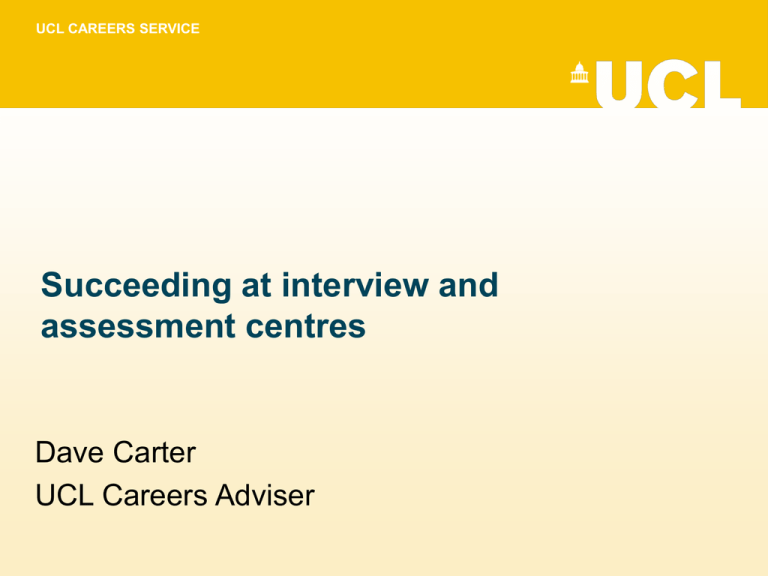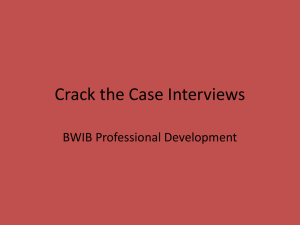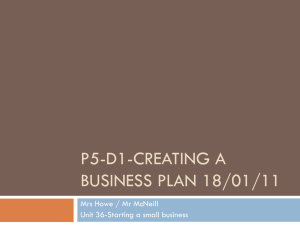
UCL CAREERS SERVICE
Succeeding at interview and
assessment centres
Dave Carter
UCL Careers Adviser
Aims of today’s session
•
•
•
•
•
gain an insight into what to expect
identify the 3 key areas of preparation
understand the typical ‘interview dynamic’
learn how to create a good first impression
identify types of question and how to tackle
them
• know where to look for further support
2
Accuracy of Selection Methods
Graphology 0%
0%
25%
References 12%
50%
Astrology
0%
Typical
interviews 15%
75%
Biodata 38%
100%
Work sample tests
55%
Assessment Centres
68%
Personality
Tests 38%
Ability tests
54%
Structured interview using
job analysis 63%
3
Public sector recruitment process
Pre-assessment centre
• Self Assessment
– realistic job preview questionnaire
– numerical/ verbal reasoning Q’s
• complete online application form (20K)
• online reasoning and competencies testing (10K)
• test centre e-tray (3K)
Assessment centre: (1K)
• written exercise – policy recommendation
• group exercise – role play
• briefing exercise
• competency-based interview
(350 successful candidates)
4
Psychometric Tests
Aptitude: verbal, numerical and diagrammatic.
•
•
•
•
administered under exam conditions or online
strictly timed – approx. 30Q’s in 30 minutes
multiple choice: right/ wrong answers
verbal tests depend on comprehension of the passage not
outside knowledge.
Personality questionnaires
• explore the way you react or deal with situations
• not looking for rigid ‘typical’ personality profile
• may receive feedback and form basis of discussion at
interview
5
Aptitude practice test answers
• Verbal reasoning
– 1: B
2: A
3:B
• Numerical reasoning
– 4: B
5:E
6:D
6
Succeeding at psychometric Tests
Aptitude:
• brush up on arithmetic, fractions and ratios, practice
crosswords etc.
• ‘How to pass’ books available to ‘loan’ from careers
service
• practise in test conditions at the careers service
Personality questionnaires:
• be as honest as you can
• practise in test conditions at the careers service
(see website for details).
7
Preparation
• re-read your application
– what might interest/ worry an interviewer
• familiarise yourself with job description/ person
specification
– what skills, qualities and experience are they looking
for? what examples can you give?
• research the company and the sector
– usp’s, customers, competitors, ‘swot’, values
– website, annual report; industry press
– company presentations, talk to people working
in related fields, (LINX alumni website)
8
Creating a good impression
• know where to go and be on time
– location
– journey time
• be pleasant to everybody
• dress appropriately
– better to be overdressed and conservative
– pass the office to get an idea
• know who you’re meeting
• prepare yourself mentally
9
Interviews: Primacy and Recency
The Perfect Interview – Max Eggert, Random House Business Books, 1999
Interviewer
Interviewee
Beginning
Middle
End
10
Performance - impact
The impact we make is based
on…
- what we say (7%)
- how we say it (38%)
- unspoken signals
Content of
(55%)
answers
Tone of voice
Body Language
11
Performance - body language
• walk confidently into the interview and shake
hands.
• make eye contact and smile
• use mirroring techniques
– e.g. leaning forward, laughing
• stay alert
– sit upright, nod
• don’t stare or look down
• slow your movements
• breathe
12
Types of questions
• Biographical
– What aspects of your degree are you enjoying?
– Tell me about yourself?
– What are your main strengths and weaknesses?
• Motivational
– Why are you interested in this role within our organisation?
– Who else have you applied to and do you have any other job offers?
– How do you keep up to date with developments in this industry
sector?
– Follow-up: Tell me something you have read recently. Why did this
interest you and what do you think are the key issues?
• Behavioural/ competence
– Tell me about a time when you worked within an effective team and
what was your role?
– When have you shown good organisational skills and the ability to
prioritise effectively?
13
Types of questions
• hypothetical/ brainteasers
– How could I estimate the number of dentists that operate in the UK?
– How would you persuade doctors to listen to you if you were a
business manager? (NHS)
– What would you do if I asked you to do something you disagreed with?
• Technical
– Give an example of where you have demonstrated your (specific)
technical knowledge to overcome a complex problem?
– Why might a company be worth more to another company than it’s
present market valuation? (Corporate finance)
• Inappropriate
- Questions which you feel are potentially discriminatory.
- Ask yourself –’Would someone of a different sex, age, race or religion
be asked this question?
14
Answering questions
• listen carefully! - answer the question asked.
• treat a closed question as though it were open:
– are you enjoying your degree?
– Tell me about your degree course and what you are enjoying?
• talk openly and with enthusiasm about your achievements, but…
– don’t waffle – keep answers to a maximum of 1 to 2 minutes
– don’t overstate them and avoid apologising or being negative.
• structure your stories:
– S:
Situation
– T:
Task
– A:
Action
– R:
Result
15
Typical interview scoring schedule
‘Tell me about a time when you showed good
organisational skills and the ability to plan effectively.’
Unacceptable: Scores 1 & 2
Above average: scores 3 and 4
• took action without developing a • evidence of planning and
plan and
prioritising
• unable to prioritise
• tools you used to achieve eg. set
objectives & milestones/ daily
schedules/ project software
need for resources and
• failed to evaluate and manage • anticipated
used them effectively eg delegation
resources appropriately
to others/ resources required
• missed important deadlines
• failed to cope with difficulties
• consistently beat tight deadlines
requiring extra commitment
• cope when things don’t go
according to plan
16
If it seems to be going wrong….
• the interviewer is aggressive or doesn’t
seem to like you
• you don’t understand the question
– ask for it to be rephrased
• you go blank or you don’t know:
– ask for “a few seconds to think about it”
– admit it, but offer instead some intelligent reasoning/ a
sensible guess (based on assumptions)
– a clue
• try not to panic - it’s unusual to fail on one
question
17
Closing the sale
• thank them
• if the job genuinely interests you then let them know
• your questions - examples:
– what are the possibilities of using my --- skills?
– What sort of career progression have other graduate
trainees experienced?
– how will my work and training be monitored and appraised?
– (context) what do you enjoy about working for the
organisation
– ‘Thanks I think everything I wanted to know has now been
covered’.
• make sure you know what the next step is
18
Interviews – summary
•
•
•
•
prepare thoroughly for every interview
first impressions count
competency questions - STAR
review your performance and ask for
feedback
19
Further resources and Careers service support
• CareersGroup: ‘How to succeed at interviews’
booklet
• 1:1 practice interviews
– on confirmation of ‘real employer interview’
• video guides:
– how to suceed in interviews and assessment centres
• ‘Top answers to tough questions’
– Matthew J Deluca/ John Lees
• employer/ CA led interview skills workshops
sign up at www.ucl.ac.uk/careers - forthcoming events:
– Practice aptitude tests – 15/21/27 Nov, 3 Dec, 14, 21 Jan……
– JP Morgan: Interview skills – Tue 13th Nov
– Accenture: What to expect at assessment centres Wed 21 Nov
– Employer led mock interviews/ assessment
centres - Jan to mar 08
20
UCL Careers Service :
4th floor ULU Building
Malet Street, London
WC1E 7HY
www.ucl.ac.uk/careers
telephone: 0207 866 3600
Email: careers@ucl.ac.uk
Opening times (term & vacation):
Mon - Thurs 9:30 -17:00
Friday 11:00 - 17:00
21









